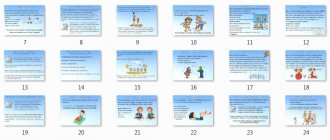Workshop-speech therapist teacher for educators
Municipal budgetary educational organization Child Development Center kindergarten No. 17 “Vasilyok”
Workshop for educators on the topic:
“Aspects of the formation of sound culture of speech through didactic games.
Compiled by:
Teacher speech therapist
Fedorova I.A.
13.10.2021
Lobnya.
Workshop for educators on the topic:
“Aspects of the formation of sound culture of speech through
didactic game.
Target:
increasing the competence of teachers in working with children on speech sound culture through didactic games.
Tasks:
- update the work experience of teachers;
- introduce teachers to techniques that help overcome various types of difficulties in the development of speech sound culture;
- gain practical experience in teamwork;
- to form professional motivation of teachers.
Equipment:
a “bee” toy, strips of napkins, a mirror for everyone, clothespins, music, a strip diagram, object pictures with the sound C, a maple leaf, a ball, reminders, a large sheet of paper with a sun, a pen.
PROGRESS OF THE SEMINAR
Introduction
Speech therapist:
Good evening, dear teachers! I suggest being active, listening carefully, expressing your opinion. I would like to start our meeting with an interesting game!
Game "Name".
Exercise:
we pass the bee to each other. The one who has a bee in his hands says his name and an adjective starting with the first letter of his name, which would characterize him as a person. For example, IRINA IS INTERESTING.
Updating knowledge
Teachers sit at tables.
- Articulation exercises.
Working on articulation develops the mobility of the tongue, jaws, lips, and strengthens the muscles of the pharynx.
The Tale of the Merry Tongue. These are all kinds of stories from the life of Tongue (“Morning of Tongue,” “Kitten,” “Horse” and other stories).
— Presentations of articulation exercises for a specific sound.
— Articulation gymnastics for girls and boys. To increase the interest of girls and boys in performing boring exercises, I suggest going on a journey through various fairy tales .
Girls will meet Cinderella, Little Red Riding Hood, Mashenka and other fairy-tale characters.
The boys will go on a trip by car .
— Articulation gymnastics to music .
I use a different musical repertoire (children's songs, modern melodies).
Children enjoy doing gymnastics.
Speech therapist:
There is a specific set of exercises for each sound. Exercises are performed in front of a mirror with the child. We make sure that the exercises are performed correctly. Now we will try the following exercises. “Spatula”, if this exercise does not work, we use “Slap on the tongue”, “Cup”, “Mushroom”, “Accordion” - we do it to the music.
Teachers stand in a circle
.
- Breathing exercises.
Exercises are used to develop diaphragmatic-abdominal breathing and develop prolonged speech exhalation.
Speech therapist:
I would like to introduce you to some gaming techniques of breathing exercises. Let's start with the youngest children. Breathing exercises are performed with poetic and musical accompaniment. I offer one of many sets of exercises: “THE CLOCK” The clock moves forward, Leading us with it. IP - standing, legs slightly apart. 1- swing your arms forward “tick” (inhale) 2- swing your arms back “tock” (exhale)
“THE STEAM LOGO” The locomotive is moving, the locomotive is moving He brought the children to kindergarten. Children move in a circle. The arms are bent at the elbows and pressed to the body, the fingers are clenched into fists. Making the appropriate movements, children say “chuh-chuh-chuh.” The exercise is performed for 20-30 seconds.
Speech therapist:
And now I suggest you get acquainted with gaming techniques for older preschoolers.
Exercise “Hamster” - sniff your nose, mouth closed (count up to 5). 3 approaches.
Exercise “Let's catch the ray” - [and].
I.p. – standing, arms down – inhale. Hands smoothly rise up - exhale: “and-and-and.”
Exercise "Snake".
Teachers sit at tables
.
- Fine motor skills exercises
:
Exercises with clothespins.
To develop finger motor skills, it is good to use various lacings, fasteners, braids, mosaics and other small objects (buttons, cereals, peas, beans), counting sticks, strokes, hatching and much more. You can devote a separate conversation to the development of fine motor skills, since there are a huge number of games and play exercises. I would like to focus on using clothespins.
- Clothes pins are good for self-massage of your fingertips. We bite each finger with a clothespin and say the words:
The silly kitten bites hard,
he thinks it's not a finger, but a mouse.
Stop biting you stupid baby
and if you bite, I’ll tell you, shoo!
- Game “Make sure you don’t make a mistake”!»
- Name pictures with the sound “S”, and determine where it is located (at the beginning, middle, end of the word). Attach a clothespin to the diagram.
- I use clothespins to carry out syllabic analysis of words. The child attaches as many clothespins to the picture as there are syllables in the given word.
- Exercises to develop phonemic awareness
Speech therapist:
And now we will play the
ball game “Name the words.”
Exercise.
I say the word “
Mac
” and throw the ball opposite my neighbor, and he must say the word to the last sound, and so the game continues.
- Automation of sounds.
Ball game "Say the opposite."
Exercise:
Everyone sat down on the floor. Whoever has the ball say the syllable SA, and rolls it to the neighbor opposite, and he must say the opposite AS. Etc. All together with me: SU, YS, SO, OS, etc.
Game with a ball “Name words for objects that start with the sound Z”, “Name words for actions”, etc.
4. Summing up
Game "Sun"
Progress:
All participants take turns writing their name above the rays, and under the rays write wishes and compliments. The sun, having completed a circle, returns to its owner.
Photo material from the master class.
GAME "Name"
Articulation exercises
Exercises with clothespins;
Game “Make sure you don’t make a mistake !”, sound analysis of words.
Breathing exercises.
Exercises to develop phonemic hearing:
Game with the ball “Name the words”, “Say the opposite”, “Name words and objects that start with the sound Z”.
MAGAZINE Preschooler.RF
Seminar - workshop for educators “Prevention of speech disorders in preschool children”MBDOU "Kindergarten of compensatory type No. 17" city of Sergiev Posad, Moscow region
GOAL: To increase the professional competence of teachers in effective work on the prevention of speech disorders in preschool children.
TASKS:
- To improve pedagogical cooperation between teachers, speech therapists and preschool teachers.
- To create, through joint efforts, conditions for the timely development of children’s speech.
Good speech is the most important condition for the comprehensive development of a child’s personality. But now a contradiction arises. On the one hand, the requirements for the child’s speech development are increasing. In the new, revised taking into account the Federal State Educational Standards, the “From Birth to School” , the speech development section includes: mastery of speech as a means of communication and culture; enrichment of active vocabulary, development of coherent, grammatically correct dialogical and monologue speech; development of speech creativity; development of sound and intonation culture of speech; phonemic hearing; acquaintance with book culture; children's literature; listening comprehension of texts from various genres of children's literature; the formation of sound analytical-synthetic activity as a prerequisite for learning to read and write.
On the other hand, children with delayed speech development or speech development disorders are increasingly coming to kindergarten. Therefore, there is an increasing need to prevent speech disorders in preschool children. Prevention is one of the most important tasks of an educational institution. The joint work of educators and parents plays an important role in this process. It is necessary to prevent speech disorders in children from an early age.
Each age parallel has its own preventive tasks: early age (from 1 year to 3 years) in a child’s life is the most crucial period when motor functions, orientation-cognitive activity, speech develop, and personality is formed. Due to the increasing number of newborns with disabilities in psychophysical development, preventive work with young children should be a priority. With age, the possibility of plastic changes in the child’s condition is lost, and the conditions for compensation and correction worsen. It is much easier to prevent the formation of deviations in the development of speech functions than to eliminate them subsequently.
The main directions of work on the prevention of speech disorders in young children:
- Formation of the motor sphere: perception of the body diagram, formation of a spatial sense, exercises for the development of general motor skills, finger games, exercises for determining the position of the lips, tongue, jaw. Development of hand-eye coordination; development of self-care skills.
- Development of higher mental functions: memory (speech-auditory, visual, motor), attention (visual, auditory, motor), perception (visual, auditory). Mental activity in connection with the development of speech (cognitive activity, visual-effective and visual-figurative thinking, mental operations), the ability to act purposefully, creative abilities, the formation of leading types of activity (subject, game). Ensuring sustainable positive motivation in various activities.
- Development of impressive speech: understanding of words denoting objects, actions, signs; grammatical categories and prepositional structures (instructions, questions, simple texts);
- Development of expressive speech: vocabulary (naming words denoting objects, signs, actions, etc.); phrasal speech, sound pronunciation, phonemic processes, activation of the dictionary, improvement of word search processes, translation of a word from a passive to an active dictionary, the formation of verbal and subject-practical communication with others, the development of knowledge and ideas about the environment.
At the age of 3-5 years, special attention should be paid to the sound-pronunciation side of the speech of preschoolers. The main directions of preventive work at this stage will be the following:
- Formation of phonemic hearing
- Development of articulatory motor skills
- Development of fine motor skills
- Development of speech breathing
Phonemic hearing
Phonemic hearing is the ability to perceive the sounds of speech, phonemes, thanks to which the distinction is made between words that sound similar: cancer - lac - poppy. Well-developed phonemic hearing ensures the correct formation of sound pronunciation, clear and intelligible pronunciation of words in accordance with generally accepted norms.
Work on the development of phonemic hearing is carried out in two stages:
- Development of auditory attention:
Recognition of non-speech sounds - games with sounding toys, noise-making jars;
Games aimed at perceiving rhythm;
- Development of phonemic awareness:
Discrimination by height, strength, timbre of sound complexes - the game “Three Bears” .
Distinguishing words with similar sound composition (tanks - sleds, barrel - daughter, slippers - hats).
Articulatory motor skills
Good diction is the basis for clear and intelligible speech. Clarity and purity of pronunciation depends on the active and correct functioning of the articulatory apparatus. Special exercises help develop the articulatory apparatus.
With children of the second youngest group, the requirements are small. Children need to learn basic movement skills.
Ex. Pancake / Spatula: Open your mouth, place a wide, relaxed tongue on your lower lip. We hold the “scapula” for a count of up to 5. Normally, the tongue should lie calmly, without twitching and not deviate to the side. Perform 5-6 times. If the child cannot relax the tongue, then first perform the exercise “Knead the dough” , which will help relax the muscles of the tongue.
Ex. Horse: We smile and open our mouths. You need to click the tip of your tongue, like horses clicking. The mouth is open, the tip of the tongue is not extended or pointed. Make sure that it does not tuck inward and that the lower jaw remains motionless.
Ex. Delicious jam: Open your mouth, wrap your wide tongue around your upper lip and “lick” the imaginary jam deep into your mouth. We move the tongue not from side to side (option 1), but back and forth (option 2). Perform 6-8 times.
In the middle group, it is necessary to monitor the precision of movements, the ability to switch the organs of the articulatory apparatus from one pose to another.
Ex. Proboscis - Fence: First, pull your lips forward like a tube, then stretch them into a smile so that your closed teeth are visible. Hold each pose for 3 seconds. Repeat the movement 5-10 times.
Fine motor skills
Exercises for the development of fine motor skills, just like articulation exercises, should be carried out systematically. Playing with children nursery rhymes, poems in combination with movement and music, finger gymnastics, laying out patterns with different types of cereals, drawing on semolina, shading, lacing and much more contributes to the development of fine motor skills of the hands.
Speech breathing
Breathing during speech differs from normal breathing, with a deeper short inhalation and a long exhalation through the mouth.
Imperfections of speech breathing and their impact on speech:
Weakened inhalation and exhalation, as a result - quiet speech, difficulty pronouncing long phrases;
irrational expenditure of exhaled air leads to impaired fluency of speech, understatement of words and phrases;
pronouncing phrases while inhaling - to convulsive, unclear speech;
uneven exhalation - speech is either loud or quiet.
Impaired speech breathing can be a consequence of:
- adenoid growths;
- general physical weakness.
Exercises to develop a long, smooth speech exhalation must be carried out systematically, making sure that the child does not blow into the cheeks. 1-2 minutes.
Ex. “Focus” : Open your mouth slightly, keep your lips smiling. We put a piece of cotton wool on the nose and try to blow it off. cup- shaped tongue to the upper lip so that its side edges are pressed against the upper lip, and there is a groove in the middle of the tongue. We blow through the groove and blow the cotton wool off the nose. If that doesn't work, you can hold your tongue slightly.
Ex. “Push the ball into the goal”: Pull your lips forward like a tube. We blow on the cotton ball for a long time, driving it between two cubes.
Voice
In parallel with the development of breathing, work is going on to develop the voice. Speech intonation and the color of a phrase are learned by the child by imitation. Voice development pathologies are quite rare.
It must be remembered that at the age of 3-5 years, inhibitory processes in the cerebral cortex are not sufficiently developed in children. At this time, it is necessary to pay attention to children with quiet and loud voices.
A loud voice can be eliminated by playing quiet or whispered speech games:
- “Echo” Repeat a sound several times. You can lightly tap on the glass, click your tongue, repeat one syllable (la-la-la), stomp your foot, etc. Let your child listen carefully and count how many times you have done this. Then he should repeat the sound, imitating you.
- “Telephone” The presenter thinks of a word and whispers it to the first player so that the others do not hear. The first player whispers into the ear of the second player what he managed to hear. The second whispers the word to the third, and so on down the chain. The last player says out loud what he heard. If the word is named incorrectly, then the presenter, through questioning, finds out who “ruined the phone.” The last player becomes the leader, and everyone else “moves” along the bench. The former presenter takes the place of the first player.
- Pronouncing poems with changing voice strength.
Quiet voice - games accompanied by loud onomatopoeia or finishing interjections.
"Come play with us . Pick up toys: bear, bunny, fox.
Children sit in a semicircle. An adult places toys at a distance of 2-3 m from the children and says: “It’s boring for the bear, the bunny and the fox to sit alone. Let's invite them to play with us. For them to hear us, we need to call loudly, like this: “Misha, go!” Children, together with the teacher, call the bear, fox, bunny, and then play with them. Make sure that when children call for toys, they speak loudly and do not shout.
Conclusion: systematic work on the development of phonemic hearing, articulatory and fine motor skills, and speech breathing creates favorable conditions for the normal development of the sound side of speech in preschool children.
Working with parents plays an important role in the prevention of speech disorders. It includes:
Familiarization with the results of the examination, the characteristics and capabilities of the child, and the plan for developmental work with the child; parent survey; attending classes; consultations for parents on the causes, characteristics of speech disorders in children and ways to overcome them; consultations for parents on the development of motor, cognitive spheres, impressive and expressive speech; educational work (preparation of leaflets, selection and distribution of literature).
If by the end of the middle group, after the preventive work you have carried out, there are still children in the group with impaired pronunciation or other speech disorders, you should recommend that parents seek advice from a speech therapist.
| Next > |
Consultation for teachers “Five-minute speech therapy sessions in the work of a teacher”
Author: Trotsenko Tatyana Petrovna
Consultation for teachers
“Speech therapy five-minute sessions during routine moments of a teacher’s work”
Target:
involving educators and parents in the correctional work of a speech therapist.
Objectives
: - to introduce educators and parents to games that promote the development of children's auditory attention and memory, phonemic hearing;
— show educators and parents ways to expand children’s active vocabulary; — show techniques for developing the prosodic side of speech. Everyone has long known the proverb “Alone in the field is no warrior.” These words are the best fit for the work of a speech therapist. Because without the help of parents and educators, his work is reduced to zero. Five-minute speech therapy sessions, which the teacher will conduct throughout the day, will be of great help to the speech therapist. These can be games to develop auditory attention and memory. Such games are useful not only for children with speech disorders, but also for children with normal speech development. Here are some examples of such games. Game "Forbidden Word"
.
Rules of the game: the adult asks the child questions. The child can answer the questions in any way he likes, but one word is chosen as forbidden. As a rule, this is either the word “YES” or the word “NO”. It is necessary to ask questions at a fairly fast pace so that the child can concentrate better. Another version of the game for the development of auditory attention is the game “Big - Small”
.
An adult names different objects. If the object is small, the child should bring his palms together. If the object is large, he should spread his arms to the sides. While playing this game, the auditory and motor analyzers work simultaneously. Game "The Longest Chain"
.
A good methodological technique for conducting this game would be to introduce an element of competition. Well, the victory itself is directly rewarded with a symbolic prize. Children sit in a circle. An adult starts the game by naming any object. The next player repeats this word and adds his own. And this is how each subsequent player acts. The result should be a long chain of words. The player who accurately repeats the chain wins. Currently, in speech therapy work, we are increasingly encountering children whose innervation of the speech apparatus is disturbed; in other words, the paths along which nerve impulses pass from the cerebral cortex to the organs of articulation are disturbed. There are more and more such children every year. These are children who have “porridge in their mouth.” In such children, not only sound pronunciation is impaired, but also the prosodic side of speech - intonation, pitch and strength of voice, timbre. Games for the development of prosody are very useful for such children. It would be very useful for teachers to help them learn tongue twisters, which children can recite with different intonations - interrogative, exclamatory, with different voice strengths - loudly and in a whisper. They can also be told in different moods - sad, cheerful, angry, scared, reinforcing the story with facial expressions. One of the main points in the work of a speech therapist is the development of phonemic hearing in children, without which it is impossible to completely correct the child’s sound pronunciation. To develop phonemic awareness, I suggest teachers play the game “Broken Phone”
.
A group of children can be divided into two teams. Team members stand behind each other. The last players of each team are shown one picture of an object. These players in a chain whisper this word to the neighboring player. The team whose last player correctly names the word wins. You can check this by showing the proposed picture. It is useful to suggest words that differ from each other by one sound. For example, a goat is a braid, a mouse is a bear. Laughter at the finish line is guaranteed. The second version
of this game is familiar to all of us from childhood.
Children sit or stand in a circle. The adult says the word. The next player must name a word that ends with the last sound of the previous word (nose - juice - braid, etc.). In this game, it is acceptable if the child calls the word “cucumber” to the sound [A]. There is no mistake in this, because... The child does not yet know the rules for spelling dictionary words. Even at school, when conducting a phonetic analysis of this word, the first sound will be exactly [A]. A game in which you need to come up with as many words as possible for a given sound will be useful. For each word the child receives a chip. The one who has the most such chips wins. Another game, “Catch a word with a given sound,”
also helps to develop a child’s phonemic awareness.
An adult names words, for example, with the sound [P], alternating them with words without this sound. Children, hearing a given sound in a word, should clap their hands. An approximate range of words: hand, sail, leg, bowl, parachute, rocket, cook, window, etc. When studying lexical topics, most educators omit a very important point - the study of grammatical categories. You can practice the diminutive forms of nouns, the plural of nouns, the formation of adjectives from nouns, the formation of possessive adjectives. It is useful for educators to expand children's active vocabulary not only through nouns, but also through adjectives and verbs. I suggest the following version of the game. Children sit in a circle. The adult names the object, and the children name the signs (actions) of this object in order. The one who names the most words without repeating himself wins. In conclusion, I would like to say that if every teacher plays at least one of these games every day, he will provide an invaluable service to the speech therapist, and most importantly, it will bring great benefit to the children. The games proposed above can be used by parents with their children and their friends during a walk or as entertainment at a children's party. comments powered by HyperComments





